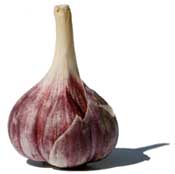By Barry Keate
Barry Keate, has lived with tinnitus over 40 years and has published 150+ research articles on numerous aspects of tinnitus. He is an expert on the condition and a well-known advocate for those with tinnitus.
Clinical study shows garlic to reduce hearing loss from ototoxic medication.
Garlic is one of the most valuable foods on the planet. For centuries it has been used for its effect on creating and  maintaining overall health. Now, a recent study shows that garlic also aids in maintaining hearing thresholds in those people subjected to ototoxic medications, thus preserving hearing and preventing tinnitus.
maintaining overall health. Now, a recent study shows that garlic also aids in maintaining hearing thresholds in those people subjected to ototoxic medications, thus preserving hearing and preventing tinnitus.
For centuries garlic has been revered for numerous health benefits which include: maintaining a strong immune system, fighting infections, antioxidant activity, reducing cholesterol buildup in arteries, regulating blood pressure, maintaining a healthy heart and preventing arteriosclerosis, or hardening of the arteries.
 Deodorized garlic, is one of the ingredients in Arches Tinnitus Formula™, and was included primarily for its ability to thin the blood, thereby improving circulation, and to reduce plaque buildup in the small artery that leads to the cochlea. Plaque buildup will severely inhibit blood flow and reduce the health of the cochlea. A new study published in 2012 offers yet another reason why garlic is so important to those of us with tinnitus.
Deodorized garlic, is one of the ingredients in Arches Tinnitus Formula™, and was included primarily for its ability to thin the blood, thereby improving circulation, and to reduce plaque buildup in the small artery that leads to the cochlea. Plaque buildup will severely inhibit blood flow and reduce the health of the cochlea. A new study published in 2012 offers yet another reason why garlic is so important to those of us with tinnitus.
Researchers from Turkey were looking for ways to reduce the ototoxicity of gentamicin, a powerful aminoglycoside antibiotic. Gentamicin is a potent broad-spectrum antibiotic. Because of its affordability, efficacy and rarity of allergic reactions it is one of the most commonly used antibiotic worldwide.
However gentamicin comes with a number of undesirable and somewhat frequent side effects including cochlear, vestibular and renal impairments. Gentamicin is toxic to the cells of the inner ear, probably through the action of reactive oxygen species, or free radicals. This is supported by the fact that ototoxicity is reduced when it gentamicin usage is combined with free radical scavengers or antioxidants.
Incidences of toxicity from gentamicin range from 6% to 16% for cochlear ototoxicity, 9% to 15% for vestibular toxicity, and from 15% to 30% for renal toxicity.
The researchers decided to test the ability of garlic to reduce oxidative stress on laboratory rats that had ototoxic reactions to gentamicin.[1]
Eighteen laboratory rats were divided into three groups: a group with gentamicin injection and garlic supplementation, a group with gentamicin injection without garlic supplementation, and a control group with neither gentamicin nor garlic.
Garlic was added to standard rodent chow in the garlic group in the amount of 4% proportional. In the garlic group, the rats were given 120 mg/kg body weight once daily and fed the garlic-supplemented diet for 16 days. In the non-garlic group, the rats were given the same dose of gentamicin but were fed a control diet. In the control group, the rats were given an injection of saline solution and fed the same control diet.
Auditory thresholds were determined for each rat both before and after 21 days using brain stem evoked response audiometry. This is a procedure where the rat is tranquilized and an auditory signal is introduced to the ear. Electrodes on the scalp record microvolt variations in electrical potential, which reflect brain response to the auditory signal.
One of the rats in the non-garlic group was lost during anesthesia. Remaining were six animals in the garlic group, five in the non-garlic group and six in the control group. In the final analysis, auditory brainstem response to sudden, loud noise was absent in all five members of the non-garlic group but was present in all animals in the control group and the garlic group.
The authors concluded that a garlic-supplemented diet seems to hold promise in preventing or ameliorating aminoglycoside antibiotic-induced hearing loss.
Someone facing an infection that needs to be treated with antibiotics would be wise to supplement with garlic. Garlic, itself, exhibits antibiotic properties and will also prevent ototoxic reactions to the medication.
[1] Uzun L, Balbaloglu E, Akinci H. Garlic-Supplemented Diet Attenuates Gentamicin-Induced Ototoxicity: An Experimental Study. Annals of Otology, Rhinology & Laryngology 121(2):139-143. 2012.
